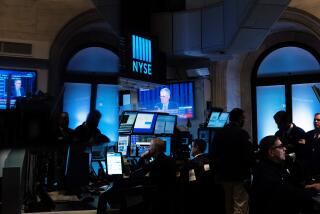Discount Brokers Offer Savings for the Savvy
- Share via
Stockbroker Stuart Turney keeps his opinions to himself--a practice that saves his clients a lot of money. A brash 26-year-old at the Brown & Co. discount brokerage in Boston, he says he believes that smart investors need brokers who are good at executing trades, not explaining them.
“If a customer doesn’t understand my questions,” he says, “I’ll cut their account. I don’t want people who don’t know what they’re doing jamming my phones.”
If you want a broker to hold your hand while Giant Petroleum’s stock is crashing through the floor, Turney isn’t your man. The only thing he and his colleagues in the nation’s fast-growing discount brokerage industry want to hand their customers is big savings in stock trades.
Since Wall Street price-slashing was born 13 years ago out of a Securities and Exchange Commission ruling that prohibited stock exchanges from enforcing set commission rates, about 80 major discount houses have sprouted around the country. Discounts of 75% off commissions charged by full-service brokerage houses are common now, and savings of 90% are not hard to find.
No Advice
“Investors are crazy not to shop around if they do a lot of trading, because they’re paying about two or three times what they should,” says Mark D. Coler, president of Mercer Financial Services, a consulting firm that tracks discount houses.
The prime reason discounters can offer such savings: They don’t pay their brokers commissions and they don’t give advice. That means they don’t have to spend millions on research departments or fancy offices to pamper sales forces and impress clients. They also invest heavily in cost-saving telephone and computer technology. One discounter is experimenting with “touch-tone” trading, a service that would allow investors to buy AT&T; stock from a phone booth, for instance, without ever talking to an operator.
Yet all accounts are insured to $500,000 by the same quasi-governmental organization, the Securities Investors Protection Corp., that protects accounts at full-service brokerages. Some even offer protection as much as $2 million in excess of the guaranty.
The most efficient way to cash in on the savings is to evaluate the kind of trades you do most often. Some discount houses charge by shares (good for people who deal in high-priced stocks), others by value (good for people who deal in low-priced stocks).
Mercer Financial has put together a list of the 20 lowest commissions charged in 17 benchmark trades in its 1988 Discount Brokerage Survey (available for $11.95 at 80 Fifth Ave., Suite 800, New York, N.Y. 10011). The variations in pricing are startling.
Experienced Customers
The purchase of 300 shares at $50 per share, for example, costs Brown & Co. customers $49. The same trade costs $107 at industry leader Charles Schwab & Co. The cheapest brokerage for that transaction, Los Angeles-based Pacific Brokerage Services, charges $25. A typical full-service house: a whopping $258.
Why the variation? Marketing strategy.
Schwab is among the highest-priced discounters because it offers extras such as access to 24-hour trading by home computer, checking accounts, Visa cards, 250 mutual funds, bond funds and certificates of deposit.
Brown & Co., on the other hand, sneers at that Main Street approach. The company--which is owned by Chemical Bank and calls itself “America’s most demanding broker”--says it will not open an account for a customer with less than five years of experience in the market. “A lot of people just want to trade at the discount rates, they don’t want the frills,” Turney, the Brown broker, says.
Pacific Brokerage Services is probably the nation’s cheapest place overall to trade stocks. The privately owned firm offers virtually nothing but common stocks: no mutual funds, no municipal bonds, no safekeeping for certificates. “I can’t sell you everything because I can’t be expert in everything,” said Steven Wallace, president.
Schwab is not too worried about its competitors’ lower rates, however, since it is by far the industry leader, with about 2.1 million accounts. In fact, just five firms--Fidelity Brokerage Services, Quick & Reilly, Olde Discount Stockbrokers, Northstar and Schwab--earned 68% of all discounters’ revenue in 1986, according to Securities Industry Assn. research.
Some Investors Use Both
Discounters’ slice of the total securities industry revenue is growing steadily, and their share of all retail stock trades has rocketed to as much as 25%, according to some estimates.
That indicates that they have become a regular part of trading strategy for many investors, according to Perrin Long, brokerage industry analyst at Lipper Analytical Services. To save money while retaining a relationship with a full-service broker, he said, thousands of investors “split the commission” on trades. Intending to purchase 1,000 shares of Bigfat Food Co., for instance, an investor might buy 500 shares through Merrill Lynch and 500 shares through a discounter.
Another tactic: Some investors buy through their full-service houses and sell at discounters. “If a broker tells you to buy XYZ at 20 and it goes down to 14,” said James Quandt, president of Security Pacific Brokers in Pasadena, “you might as well save 75% to get out.”
Black Monday and the uncertainty that followed has affected discounters about the same as full-service houses. Thousands of discount clients swarmed to full-service houses after the crash and thousands of full-service clients swarmed to discounters. Confusion and resentment reigned; angry investors sought refuge in change. Trading volume is down substantially at both from last year’s level.
Merrill Lynch spokesman Fred Yager says investors flocked to his firm because they could not reach their discount brokers on the phone during the crash. Discounters counter, saying that full-service brokers were even harder to reach. “If you deal with John Doe at Merrill Lynch, you had to wait for John Doe to take your call,” Quandt said. “Our operators could send you to one of 30 brokers.”
Banks in the Game
Long, however, says both discounters and full-service firms execute trades at about the “same degree of effectiveness.”
Despite the bluster, all were chastened on Oct. 19; many took losses on customers who borrowed to buy stock (through so-called margin accounts) and couldn’t pay up. The result: Most discounters report tightening collateral requirements for margin accounts and are scrutinizing option trades much more carefully.
Despite the risks and modest growth, dice-rolling entrepreneurs don’t have the discount trade to themselves. Hundreds of banks and credit unions now offer cut-rate stock trades. Los Angeles-based Security Pacific Bank, however, goes a step further in having its own brokerage.
Being attached to a bank gives Security Pacific Brokers certain advantages. Bank customers’ checks clear very quickly--there is no need to wait five to 10 days for a stock transaction to be finalized. “It’s like credit cards,” Quandt said. “We know quickly if you’re a flake.” And trading profits can be swept automatically into a customer’s checking account. If you make a killing in GM on Wednesday you can make a deposit on a Corvette by Friday.
Security Pacific also has the financial wherewithal to spend thousands of dollars a month on a newsletter called Market Advantage--a nicety that teeters on the brink of giving advice. The publication excerpts opinions from investment newsletters and from research reports of the major houses.
No Time to Schmooze
Still, the proscription on advice is the inviolate rule among discounters. Here is a hypothetical call, according to Quandt and others:
Client: “I’m thinking of buying Texaco. What’s it doing?”
Broker: “51, up a quarter. The bid is 51, the ask is 51 3/8. Trading volume is 798,000--significant for the stock.”
Client: “That corporate raider, Carl C. Icahn, might make another play for it. Sounds like the stock is stagnating, but if he makes a hostile bid it might shoot up. What do you think?”
Broker: “All I can tell is what’s on the wire. Do you want to place an order?”
It doesn’t sound like much fun for brokers, and in fact, full-service houses deride discounters as order-takers or clerks. But that is just what the experienced investor wants, according to experts.
Says Coler: “Anyone who does their own research and makes a lot of trades with a mediocre broker at a full-service house is ignoring just enormous savings that come with no sacrifice of safety or quality of execution.”
COMPARISON SHOPPING FOR BROKERS
It pays to shop for a broker. For some, the dollar value of a deal primarily determines the commission. For others, it’s the number of shares involved in a trade, regardless of cost per share. Listed below are lowest commissions charged for each of several common transactions, plus three higher-priced discounters and a full-service broker.*
200 shares at $30
Pacific Brokerage Services $25.00
Kennedy, Cabot & Co 35.00
Pace Securities 35.00
Wall Street Discount 35.00
Bidwell & Co. 36.00
Olde Discount 60.00
Quick & Reilly 65.58
Wells Fargo Bank 72.00
Merrill Lynch 142.00
500 shares at $20
Pacific Brokerage Services $42.00
Barry W. Murphy & Co. 47.50
Bidwell & Co. 50.00
Brown & Co. 50.00
Kennedy, Cabot & Co. 50.00
StockCross 67.50
The Stock Mart 88.18
Union Bank 95.00
Bateman Eichler 147.00
1,000 shares at $5
Odd Lots Securities 47.32
Quick & Reilly 50.00
Richard Blackman & Co. 50.00
Pacific Brokerage Services 53.00
Robert Thomas Securities 55.00
First Interstate Bank 65.00
Fidelity Brokerage Services 68.00
Charles Schwab & Co. 74.00
Dean Witter 200.00
* Most full-service brokers offer discounts of 15%-25% to “active” investors, such as those who makes two to three trades a week.
Source: Mercer Financial Services.
Los Angeles Times
More to Read
Inside the business of entertainment
The Wide Shot brings you news, analysis and insights on everything from streaming wars to production — and what it all means for the future.
You may occasionally receive promotional content from the Los Angeles Times.








